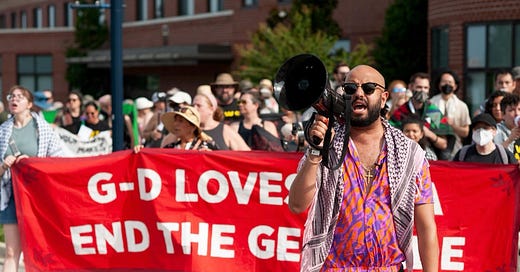The efficacy of protests
I protest not just to change the world, but also so that the world doesn’t change me.
I was one of the organizers for the Interfaith Action for Palestine protest of the CUFI convention. CUFI is a Christian Zionist lobbying group that believes that Israel needs to be restored in order for Christ to return, and God judges the Jewish people they are supposedly advocating for. It is deeply harmful eschatology and also deeply antisemitic. We were organizing for Palestine, against Christian Nationalism and Zionism, and against antisemitism.
We had many meetings, exchanged thousands of Signal messages, and held trainings in person to make sure that our protests went as seamlessly as possible. Our goal was to be organized, effective, and kept everyone as safe as possible. This weekend, hundreds of us gathered with power, enthusiasm, and confidence that we would make our voice heard.
On the evening before our protest, our team left DC proper and went to the National Harbor to do some reconnaissance. Our plan was the enter the hotel hosting the CUFI convention, sing songs, lead chants, blow horns, and drop and display banners that reminded the attendants of the conference that CUFI kills, that God doesn’t bomb children, that Christian Zionism is antisemitic, and that God loves Gaza. But when we got to the hotel, we learned that in order to enter, one needed a room key or a lanyard. We felt defeated at that prospect; it felt like months of organizing just went down the drain.
As we gathered to re-imagine our strategy, we turned what looked like defeat into a victory. Our coalition protested this very conference last year. We were able to enter, sing songs, hang banners, and make our presence known. We were so effective and so powerful, that the organizers of the CUFI convention made sure we didn’t disrupt them again. That’s a win! Furthermore, compared to last year, this year’s police presence in the National Harbor was much more significant. It was as if they were anticipating a significant presence from our group.
It was with that perspective that we framed our newly strategized action. Instead of entering the hotel, we would march around it, with our banners, songs, and chants. We wanted to demonstrate that the Gaylord hotel and CUFI were too afraid to let us in and hear from us. But we wouldn’t be silent about CUFI’s and the hotel’s complicity in genocide and famine.
In the morning, we successfully pulled off the action. Our marshals kept us safe, our police liaisons minimized our risk, and our leaders guided us through the event. Passersby, CUFI attendees, and workers heard our message. Some vocally disagreed with us, but others nodded their agreement, or even sung some of the songs we were singing.
I think it’s easy to look at what we did and consider it a failure, since what we planned didn’t happen. It is surely disappointing, but we were nimble and agile, and found a way to flex. We showed faith and courage in the face of adversity. We certainly wished we could have confronted the attenders of the conference, but not all was lost because things didn’t go according to plan.
Too much of the time we evaluate the efficacy of a protest by imagining whose minds we changed, whose policies we influenced, and whose votes we converted. I think that having numerical goals like that isn’t without merit, but it cannot be the only measure by which we evaluate our activism.
I desperately want to change the world. I want it to be a more peaceful, a more loving, and more equal place. I will continue to do my part to make that work possible. I will continue to call my lawmakers, host and attend rallies, and disrupt as much evil as I can. In the National Harbor, I think we made a mark and made a difference.
But the success of a protest isn’t just about how effective it is in terms of policy goals. Another point of our protest, and any protest, is to raise awareness about the issues at hand. In this particular case, we wanted to raise awareness about what CUFI is and stands for. CUFI is actually larger than AIPAC (another pro-Israel lobby group that is frequently mentioned) but not a lot of people know that about it.
We also didn’t want to necessarily change the mind of attenders,but help those who were otherwise ignorant or ambivalent to join the cause for Palestinian freedom and justice. Hosting events, like this weekend-long protest, is a great opportunity to grow the movement and build our power.
And most importantly to me, we protest not just to change the world but so that the world doesn’t change us. I don’t think I will become a Christian Zionist or Nationalist any time soon. But I can get beat down or tired and grow cynical of protests. So I protest to guard myself against those things.
We protest so that we stay strong in our convictions. We do it because we keep us safe. We do it because it is easy to fall victim to our despair or cynicism. We do it to keep our hope alive, to keep our conviction going, to continue to have faith.
Another world is possible. Justice is possible. Freedom is possible. And a free Palestine is possible too.



